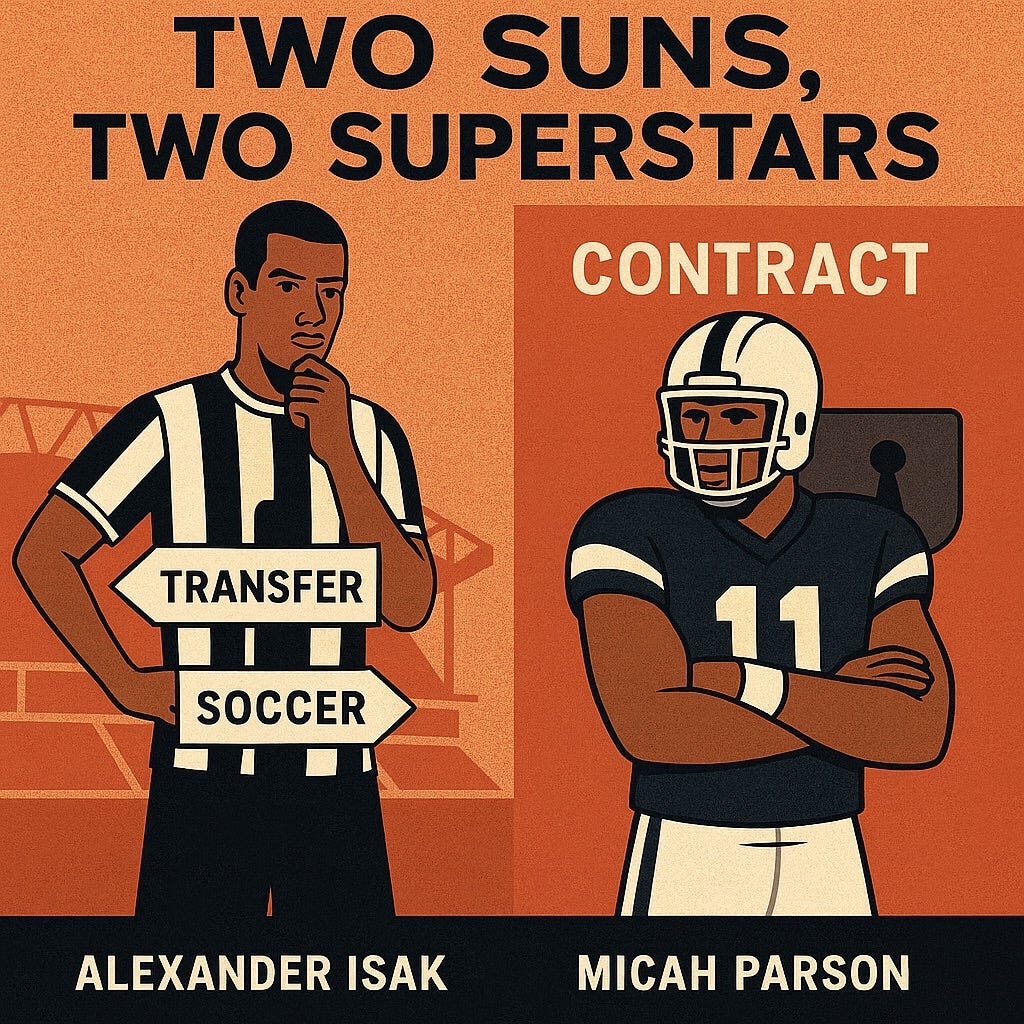Two Suns, Two Superstars
Why Alexander Isak can wander, while Micah Parsons must wait
Dawn breaks over the River Tyne. Alexander Isak sips coffee on his balcony, the gulls thick in the Newcastle sky. His phone buzzes: Liverpool’s bid—£110 million plus sweeteners—has been swatted away overnight. The press pack is already spinning tales of “unsettled” Swede and looming PSR deadlines. Isak exhales, smiles, and pockets the device. A rejected offer is still an open door. In soccer, leverage is a season that never ends.
Six time zones west, the sun is crueler. Oxnard’s camp fields sizzle as Micah Parsons jogs out in a hoodie he won’t remove. His tweet—“Thank you Dallas!”—is fresh ink on every back-page but nobody is confused: thank-you means trade-me. The Cowboys’ owner, Jerry Jones, has already told reporters he’s “not confident” Parsons plays Week 1—and yet Dallas won’t budge. They don’t have to. NFL bylaws say so.
A Sport of Exit Ramps vs. A Sport of Cul-de-sacs
Isak’s contract is a 60-page velvet rope: fully guaranteed wages, but the clasp pops the moment another club wires enough cash. England’s Profit & Sustainability Rules make that money look irresistible—pure profit on this year’s books, amortized cost for the replacement. Each Liverpool flirtation tightens the financial vise on Newcastle. Isak can skip a preseason tour, flash a cryptic emoji, and let accountants do the shouting for him.
Parsons’ deal is a steel trap hidden in the collective bargaining agreement. Dallas picked up his fifth-year option at $24 million; they can tag him twice after that. Real holdouts now cost $50k per camp day—non-forgivable—plus lost pension credits and a frozen path to free agency. In other words: he can bark, but the gate is padlocked.
Behavior Becomes Leverage
Isak doesn’t need to rant. A half-hearted training lap, a missed media day, and murmurs will grow into “player unrest.” Somewhere in Merseyside, sporting directors refresh spreadsheets; somewhere in Riyadh, a sovereign-wealth inbox pings. Soccer’s marketplace is borderless and cash-rich; a dissatisfied star becomes an investment opportunity.
Parsons has only sound and fury. He practices—but lightly. He praises teammates while side-eying the front office. Each social-media jab grabs headlines, yet every day he remains a Cowboy because 31 other desks obey the same hard cap. In the NFL, you don’t change teams; teams change you.
The Rulebook, the Real MVP
Open ecosystem: Soccer invites bidders from five continents; exit visas are called transfer fees.
Closed ecosystem: The NFL corrals 32 owners under one salary cap and one punitive CBA.
Accidental ally vs. deliberate gaoler: UEFA’s accounting rules accidentally grant Isak a battering ram; the NFL’s tag system deliberately hands Jerry Jones a fortress.
Moral for Every Rising Prospect
Before you master a stepover or perfect a spin move, read the fine print. The league you join decides whether silence can move mountains or whether fireworks fizzle at the commissioner’s desk.
Alexander Isak can wander because soccer was built on the idea that stars are transferable commodities. Micah Parsons must wait because football was built on the idea that stars are franchise property.
Choose your dream wisely; the terrain under your cleats—or under your spikes—may decide how loudly you’ll be heard when it’s time to ask for what you’re worth.


